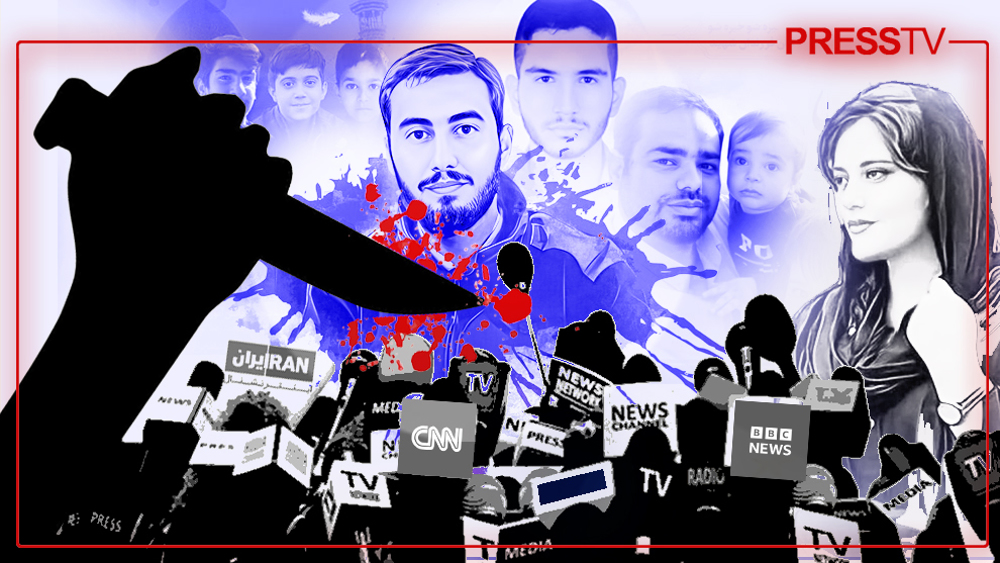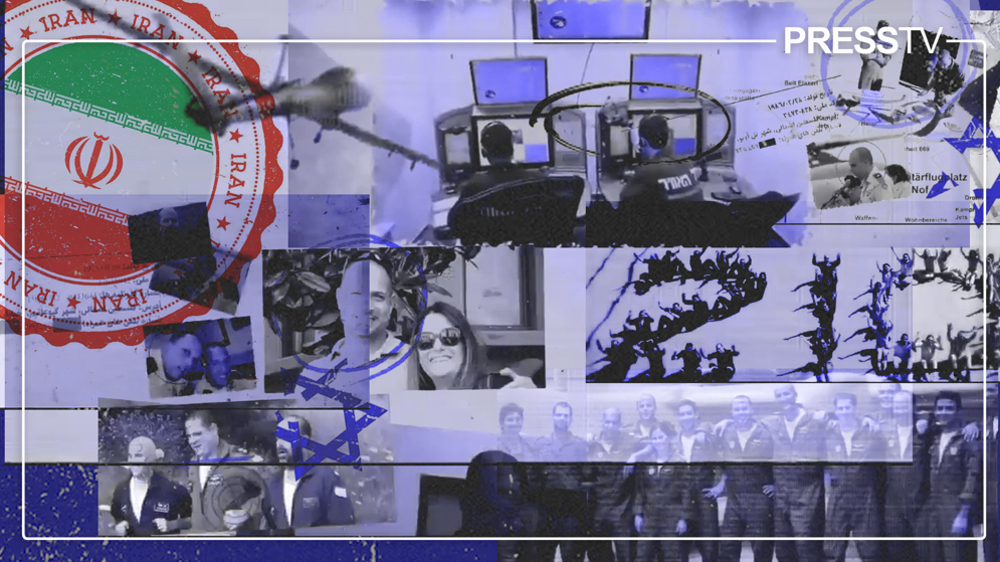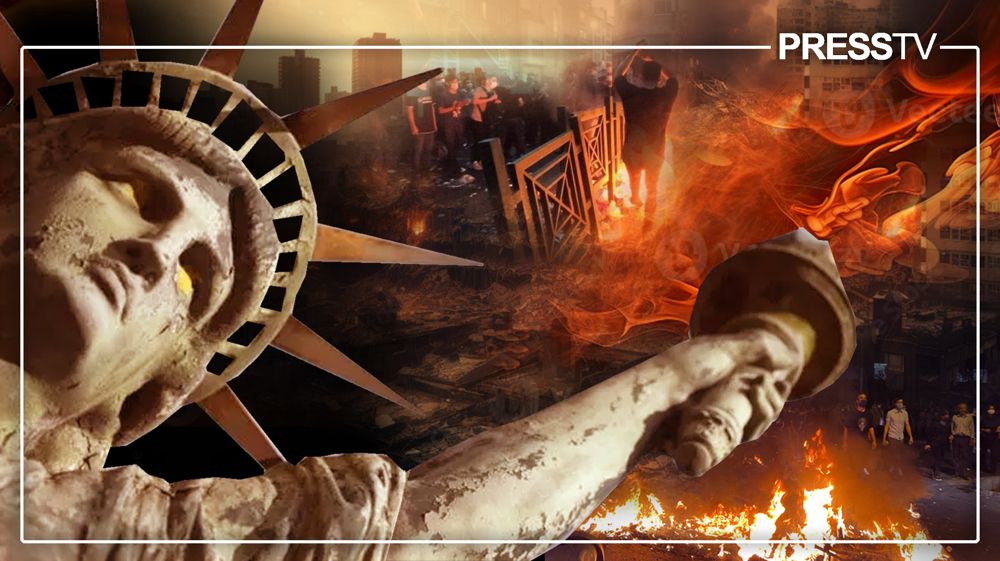One year since Arman Aliverdi and others were killed in West-backed riots
By Hossein Moradi
This week marks the first anniversary of the martyrdom of Arman Aliverdi, a young Iranian man killed during foreign-backed deadly riots in Tehran on October 26 last year.
Aliverdi was one among many who were caught, beaten, dragged, stoned and mercilessly bludgeoned to death on the streets of Tehran in what one of his friends and eye-witnesses later said resembled "Daesh-like murders."
Investigations by Iranian security agencies established that these murderous attacks were not spontaneous or co-incidental but meticulously planned and organized in coordination with foreign agencies.
Most of these perpetrators were recruited via the Internet and promised large sums of money as well as sanctuary in Western countries, while many others came from neighboring countries and entered Iran via the borders of Kordestan, Khuzestan and Baluchistan.
Terrorist groups operating in some border provinces also collaborated with foreign agencies in carrying out subversive activities and stoking the flames of unrest, which is why the highest number of fatalities were recorded in border provinces.
Recruits received training and instructions through the internet on sensitive targets, making homemade bombs and improvised weapons, swarm attacks and other tactics.
Basij members were their favorite targets because they carried only cold weapons and oftentimes found it difficult to defend themselves against rioters armed with firearms, as well as against group attacks.
The riots were triggered by the death of Mahsa Amini while in police custody. Although medical and forensic reporters established that her death was due to natural causes, Western media and governments falsely accused Iranian police of "killing" her.
Arman Aliverdi
Arman Aliverdi was a 21-year-old student of religious studies at the Mojtahedi Seminary in Tehran. On October 26, he was abducted by a group of rioters in the neighborhood of Ekbatan in western Tehran.
According to eye-witness accounts and confessions of the accused, he was repeatedly told to insult the Islamic Republic and the Leader of the Islamic Revolution, an order he refused to obey. This non-compliance led to the brutal attack on him.
They stripped him of his clothes, kicked him, punched him, slapped him, insulted him, tortured him, and stabbed him with knives multiple times, causing severe injuries.
His head, shoulder and nose were completely fractured, according to doctors at the hospital, which led to both internal and external bleeding.
Aliverdi was left in pools of blood on a desolate street in western Tehran. Hours later, when pedestrians spotted him, they rushed him to a nearby hospital but he succumbed due to excessive bleeding.
During the judicial trial of the perpetrators, it was discovered that they were provoked to commit the crime by misinformation spread by Western media outlets, and some of them had been trained by foreign countries.
Thousands of people attended Aliverdi's funeral in the neighborhood of Shahran, and two streets were named in his honor. Leader of the Islamic Revolution, Ayatollah Seyyed Ali Khamenei, hailed the young martyr in one of his speeches, calling him "dear Arman."
The abduction and killing of the 21-year-old man was reminiscent of the 1980s when the MKO terrorists would carry out similar summary executions on the streets of Tehran and other Iranian cities.
Ruhollah Ajamian
Seyyed Ruhollah Ajamian was a 27-year-old man from the city of Karaj on the outskirts of Tehran who while heading to work on November 3, 2022, learned about riots in the city. He went to help restore law and order.
Some rioters were following him and surrounded him on the Karaj-Qazivn highway. Although he was an expert in martial arts, he was unable to defend himself against a crowd of rioters armed with stones, knives, machetes, and brass knuckles.
Ajamian was brutally and cowardly beaten, stripped half-naked, dragged along the road and hidden under a truck, where one of the men stabbed him several times with a knife.
A colleague found him half dead and called an ambulance, but the driver warned them that the victim was wearing military pants and that rioters could attack them as well.
He testified that several ambulances were badly damaged and that rioters were controlling the road and checking vehicles, which is why it was not possible to immediately transfer Ajamian to the hospital for timely treatment.
By the time they found transportation and a safe route, it was too late and he died on the way to the hospital.
During the trial, one of the key accused, Mohammad Mahdi Karami, said they were "deceived" by foreign media propaganda.
“I heard someone say there is a Basiji man out there. I turned around and saw he had fallen to the ground and three people were surrounding him and beating him," Karami said in a video of a televised trial, describing how he and his accomplices killed Ajamian.
The young man tried to run away, Karami hastened to add, going on to explain in detail how the group of rioters chased him and killed him.
“Everyone was hitting him with stones, knives, even bare hands. I can say at least 30 to 40 people were hitting and stabbing him. I saw knives of different sizes and shapes. Some had brass knuckles (fist-load weapons). Some had stones in their hands and others had nothing. Their attitudes were weird,” he said.
“I hit him with a stone on his head and then punched his head three times. He fell to the ground. As soon as he fell to the ground, a guy was kicking him violently on his side and trunk."
Salman Amir-Ahmadi
Salman Amir-Ahmadi was a 35-year-old employee of Labbafinezhad Hospital, living in the neighborhood of Fallah in southern Tehran with his wife and two little children.
One of his two siblings was killed in 2005.
On October 8, 2022, in the neighborhood of Emamzadeh Hassan near his home, along with his brother Muhammad Ali and 13 others, Amir-Ahmadi was cleaning up the mess and arson left behind by rioters.
After finishing the work, they planned to go back home but were informed that deadly riots had broken out in a nearby street that led to a furniture market.
Having reached one of the alleys near the scene of riots, the rioters started pelting stones at them and shouted obscenities. According to his brother's testimony, suddenly there was a loud sound and Amir-Ahmadi collapsed to the ground with a gunshot wound to his neck.
Even after being hit, he was still breathing and was transferred to the Ziaeian Hospital, but due to the severity of his injuries, he succumbed.
Three days later, a funeral procession for the 35-year-old was attended by a large group of people, including Tehran’s governor-general.
Daniel Rezazadeh & Hossein Zeinalzadeh
Daniel Rezazadeh was a 25-year-old man from the city of Mashhad, who became an orphan at the age of five and worked hard to become the breadwinner for his family.
He was socially active and participated in humanitarian endeavors, including helping flood victims in Lorestan, and earthquake victims in different parts of Iran, and even spent months in Iraq to voluntarily help in the reconstruction of holy shrines.
On the night of October 23, 2022, Rezazadeh and his fellow Basiji friend Hossein Zeinalzadeh were deployed in the Abu Dhar district of Mashhad to maintain security, when a man appeared with a cold weapon and brutally stabbed both of them to death.
The horrific crime was caught on video, which soon spread on the internet and helped identify the perpetrator, who was found, convicted and executed.
The accused in the case, Majid Reza Rahnavard, admitted during a hearing that he killed the two young Basijis as he was "influenced by fake news", even mentioning the names of notorious anti-Iran rabble-rousers like Masih Alinejad and Ali Karimi.
"I was influenced by the fake news that was published on social media regarding the riots, which pushed me to stab two members of the security forces, as well as passersby, with a knife," Rahnavard said.
"At the moment, I did not realize I was doing something inhumane. I killed my brothers. What I did was inhumane, and I wish to be punished for what I have done."
Rasool Doust-Mohammadi
Rasool Doust-Mohammadi was another martyr from the city of Mashhad, known in his community as a cultural worker and humanitarian who helped the victims of the earthquake in Sarpol-e Zahab in Kermanshah province.
He was also very active in organizing annual Muharram ceremonies in his small town, sometimes with kitchen work, sometimes in putting up banners and posters, and sometimes serving tea in the streets, according to his friends and acquaintances.
Toward the end of September last year, together with his colleagues, he confronted rioters who were trying to destroy and set fire to religious installations in the city.
One of them was attacked by a masked rioter with a knife and stabbed 13 times. When Doust-Mohammadi came to his aid, he himself was stabbed in the heart.
As rioters blocked the passage of ambulances, he was unable to reach the hospital on time and died on the way.
Farid Karampour
Farid Karampour Hasanvand was a 21-year-old policeman born in Dowreh County in Lorestan province, and a resident of Parand, a city on the outskirts of the capital Tehran.
Since his teenage days, was passionate about working in the police force, special unit, and especially in the anti-narcotics headquarters, according to his family and friends.
Hasanvand had told his family that he wanted to be useful for his country, like his hero and Iran's top anti-terror commander Lt. Gen. Qassem Soleimani.
Sixteen days before the fateful day, he went on a pilgrimage to the Iraqi city of Karbala, where he wished martyrdom for himself.
One day before he was martyred, Hasanvand had injured his leg while on duty. His supervisor suggested that he stay at home until the leg healed, but the young man insisted on coming to work, saying that he could not sit at home while his colleagues risked their lives on the streets.
On the fateful night of September 21, 2022, Hasanvand and his colleagues were on their motorbikes after work hours when they heard the sound of a Peykan car rushing towards them at a speed of over 100 km/h.
The 21-year-old was first knocked to the floor and then crushed as the Peykan driver deliberately ran over him. He was critically wounded and transferred to the hospital in Robat Karim, then to the Vali-ye Asr Hospital in Tehran, where he died five days later.
The perpetrator was soon identified by police and referred to the judiciary. In court, he confessed to the gruesome crime, saying he was deluded and brainwashed by social media videos.
Hossein Taghipour
Hossein Taghipour was a Basiji member, a native of Miyaneh and a resident of Eslamshahr near Tehran. He was married and had a 17-year-old son.
Amid riots, he and his colleagues were busy with maintaining peace and order in the Tehranpars neighborhood of eastern Tehran, when they were surrounded by a group of rioters wearing masks and gloves.
In a sudden swarm attack, which reportedly lasted only a few minutes, the rioters hit Taghipour on the head with blunt objects, after which he collapsed and immediately slipped into a coma.
An ambulance picked him up, but he died moments later and was laid to rest at Imamzadeh Aqeel in Eslamshahr.
Medicine shortages in Gaza reach alarming levels amid Israeli siege: Health ministry
Nigeria says 130 schoolchildren abducted by terrorists freed
Israel to ‘permanently’ arm 10,000 reserve forces after al-Aqsa Flood lessons: Report
VIDEO | Press TV's news headlines
VIDEO | No war for oil: Londoners protest US bullying Venezuela
VIDEO | French MP demands inquiry into arms sales to Israel
Iran-EAEU coop. paves way for 'powerful region': President Pezeshkian
VIDEO | Iranians celebrate Yalda Night nationwide











 This makes it easy to access the Press TV website
This makes it easy to access the Press TV website